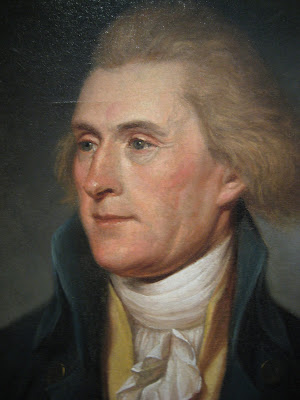From the age of fifteen until he turned thirty, he kept a Literary Commonplace Book[2] in which he pasted newspaper clippings of favorite poems and prose. Beginning in 1801, he began the first of two poetry scrapbooks dedicated exclusively to poetry clippings.[3] Jefferson also helped his granddaughters create their own poetry scrapbooks. One of them, Virginia Randolph Trist, recalled that "whenever an opportunity occurred, he sent us books; and he never saw a little story or piece of poetry in a newspaper, suited to our ages and tastes, that he did not preserve and send it to us."[4]
A number of scholars have attributed to Jefferson an unfinished poem, "To Ellen," indicating that it may have been intended for his granddaughter Ellen Wayles Coolidge.[5]
“To Ellen”
Tis hope supports each noble flame,
'Tis hope inspires poetic lays,
Our heroes fight in hopes of fame,
And poets write in hopes of praise.
She sings sweet songs of future years,
And dries the tears of present sorrow,
Bids doubting mortals cease their fears,
And tells them of a bright to-morrow.
And where true love a visit pays,
The minstrel hope is allways there,
To soothe young Cupid with her lays,
And keep the lover from despair.
Why fades the rose upon thy cheek;
Why droop the lilies at the view?
Thy cause of sorrow, Ellen speak,
Why alter'd thus thy sprightly hue?
Each day, alas! with breaking heart,
I see they beautous form decline;
Yet fear my anguish to impart,
Lest it should add a pang to thine...
Jefferson may have composed some light verse during periods of his later life, but the only surviving poem of definite authorship by Jefferson was written in 1826, at the approach of his death. Confined to bed by illness, Jefferson wrote "A death-bed Adieu" for his daughter, Martha [“Patsy”] Randolph[6]. On July 2nd, two days before he died, Jefferson told Martha that he'd composed a farewell in her honor; following his instructions, she found the verse in a small box after his death. ['Two Seraphs' refers to Jefferson's wife, Martha, and to their daughter Maria Jefferson Eppes, born August 1, 1778; died April 17, 1804].”
“A death-bed Adieu” -- TJ to MR
Life's visions are vanished, it's dreams are no more.
Dear friends of my bosom, why bathed in tears?
I go to my fathers; I welcome the shore,
which crowns all my hopes, or which buries my cares.
Then farewell my dear, my lov'd daughter, Adieu!
The last pang in life is in parting from you.
Two Seraphs await me, long shrouded in death;
I will bear them your love on my last parting breath.
____________________________
Source: The Library of Congress https://www.loc.gov/rr/program/bib/prespoetry/tj.html
Notes:
1. Until recently, most scholars thought that Jefferson's interest in poetry waned significantly in his later years. To learn why this may not have been the case, see Jonathan Gross's "When Jefferson Dined Alone" (http://hnn.us/articles/20061.html, History News Network, February 12, 2006). 2. See Jefferson's Literary Commonplace Book, ed. Douglas L. Wilson (Princeton, N.J.: Princeton University Press, 1989) for a critical edition.
3. The contents of Jefferson's poetry scrapbooks can be found in Jonathan Gross's Thomas Jefferson's Scrapbook's: Poems of Nation, Family & Romantic Love Collected by America's Third President (Sterforth Press: Hanover, New Hampshire, 2006).
4. B. L. Rayner, Sketches of the Life, Writings, and Opinions of Thomas Jefferson. With Selections of the Most Valuable Portions of His Voluminous and Unrivaled Private Correspondence (New York: A. Francis and W. Boardman, 1832.): 346-47.
5. Ellen (Eleonora) Wayles Randolph (1796–1876), the fourth child of Thomas Mann Randolph and TJ’s daughter Martha Jefferson Randolph, shared her name with an elder sister who died in 1794. Born at Monticello, Randolph returned with her family to live there following her grandfather’s retirement from the presidency. She became one of TJ’s favorite grandchildren, often accompanying him on trips to Poplar Forest and Natural Bridge. In 1816, with his financial assistance, she visited Richmond, Washington, Baltimore, and Philadelphia, winning renown as an intelligent conversationalist. On May 27, 1825 in the Monticello drawing room, she married Joseph Coolidge, a Bostonian who had first visited TJ a year earlier. When the newlyweds settled in Boston, the separation proved difficult for both TJ and his granddaughter. Ellen Coolidge corresponded regularly with those who remained at Monticello but did not return until just after TJ’s death.
6. The poem first appeared in its entirety in Sarah Randolph's The Domestic Life of Thomas Jefferson (1871). A facsimile of the original manuscript is available at Virginia's James Monroe Museum.


No comments:
Post a Comment